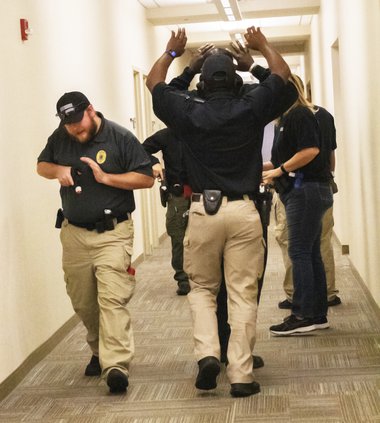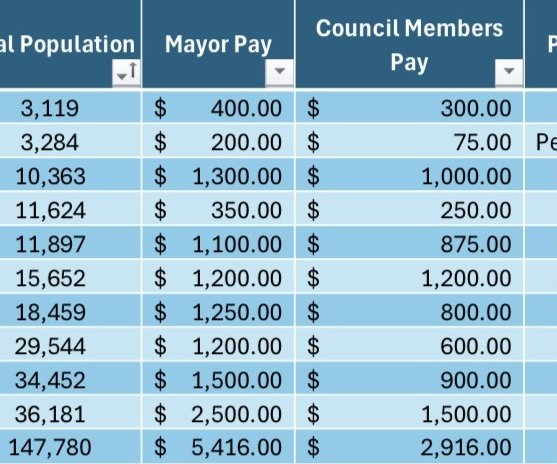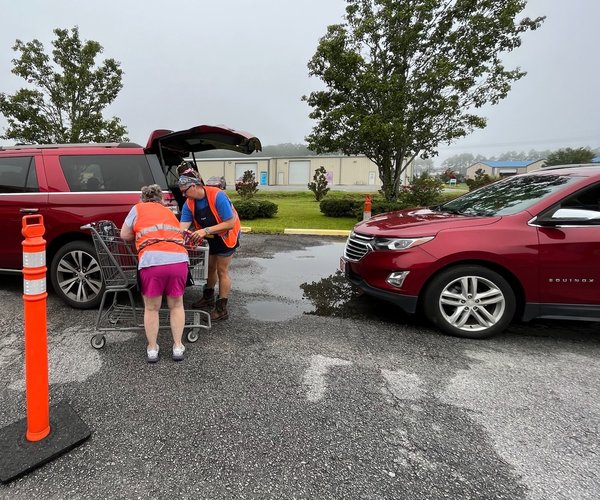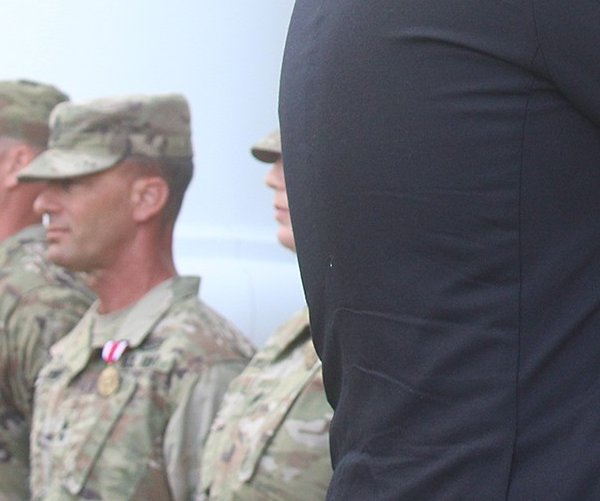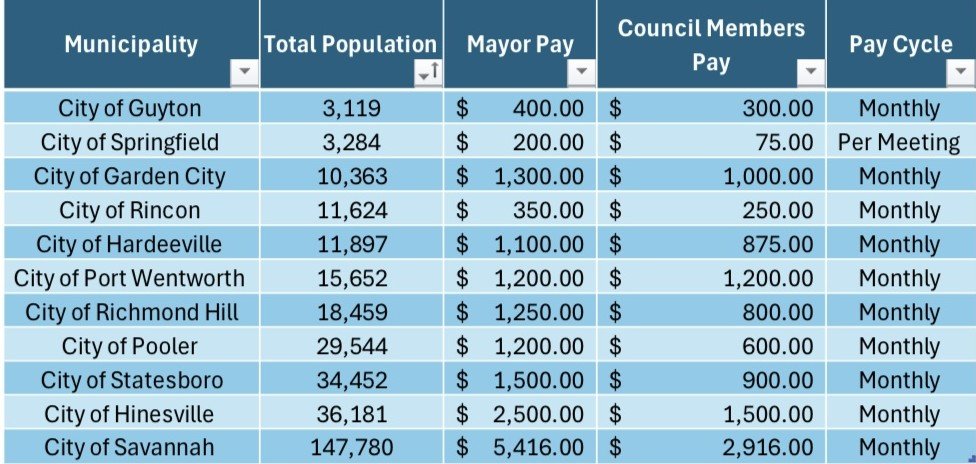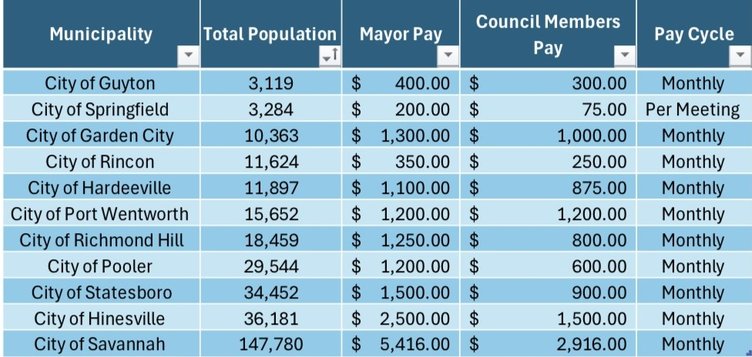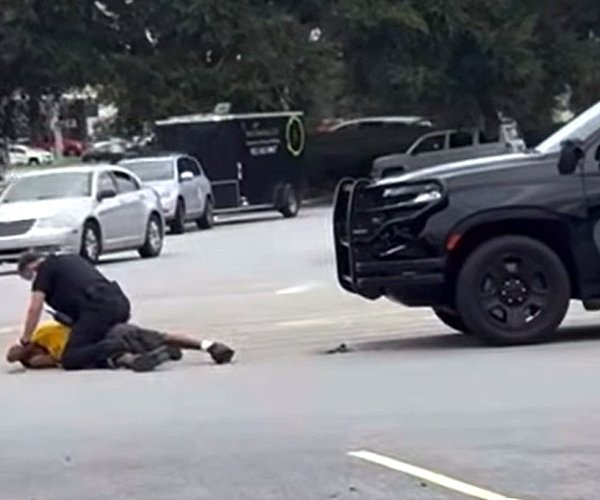You never know what situation you are walking into. This is the best situation to train for it — face real-life situations with real consequences. Here, the consequences aren’t death. This is a class where you are trying to learn and ingrain in your brain what you have to do because it has to be muscle memory when it happens.Gena Sullivan, Effingham County Sheriff's Office PIO
SAVANNAH — The law enforcement officers could feel the tension created by the make-believe scenarios. All fully understood, however, that the pressure would be amplified a thousand times if the situations were real.
A total of 24 officers from agencies in Chatham, Effingham and Liberty counties, and six from Savannah Technical College were recently put through their paces by four instructors from the Federal Law Enforcement Training Center (FLETC). The instructors explained how a lone officer should handle an active shooter at a school or other highly populated building or area.
The drills were conducted at Savannah Technical College’s Savannah Campus. The college also has facilities in Hinesville, Rincon and Fort Stewart.
Participating agencies included the Hinesville Police Department, Chatham County Police Department, Liberty County Sheriff’s Office, Rincon Police Department and Chatham County Board of Education.
“This is something that is required by the Technical College System of Georgia — TCSG — annually for all the police departments (in the system),” STC Police Lt. John Taylor said. “Chief (Wayne) Wilcox, our chief, decided that it would be a good idea to try to host it here because that would allow us to get most of our people involved to include all the officers from all our campuses, to include Effingham, so we decided to host it and we made contact with the Federal Law Enforcement Training Center (FLETC). They have this program, which is called Active Shooter Response.
“It is geared toward the sort of problems that we would have at a technical college because we do not often have multiple officers on duty at once. Usually, at most, we will have two.”
The 1999 shooting at Colombine High School in Colombine, Colorado, changed the way many law enforcement agencies deal with active shooters. Prior to that incident, which resulted in the deaths of 12 students and a teacher, officers were trained to wait until two or three backups arrived before entering a building and moving toward the shooter.
Jackson said, “The standard law enforcement way of handling an active shooter was for the first arriving officers to set up a perimeter and wait for a SWAT (Special Weapons and Tactics) team to come with negotiators and deal with the situation.”
Now officers — prompted additionally by 17 fatalities in the 2018 Stoneman Douglas High School shooting in Parkland, Florida, — are trained to act alone to minimize the amount of time that a shooter has to kill.
“This program focuses on that type of response and ability,” Jackson said. “It’s really geared toward academic institutions.”
The Dec. 15-18 training was broken into segments. The first day focused on the proper use of each item in a first-aid kit and how to treat gunshot wounds. The final three days dealt with tactical situations, including the use of two-officer teams to engage a shooter.
The scenarios involved actors. During a Dec. 17 practice session for the Dec. 18 finale, Effingham County Sheriff’s Office PIO Gena Sullivan pretended to be a victim fleeing a classroom with a shooter inside.
“When you are playing a victim, you are kind of just talking it all in,” she said.
Sullivan, however, is well aware of the intense scrutiny trainees get while responding to situations. The instructors aren’t the least bit shy about yelling their disapproval of mistakes.
“(The trainees) are very focused, goal oriented and purpose driven,” Sullivan said. “When they are coming down that hall, they know they have a threat and they are trying to assess it.”
Cpl. Kurtis Smith of the Rincon Police Department, a 10-year law enforcement veteran, described his thoughts about the challenges.
“Your adrenaline is going,” he said. “Your breathing starts getting heavy and there is ‘blood’ on the walls, and you are moving as quickly as possible to handle the situation that faces you.”
Sullivan said officers have to be ready for anything.
“You never know what situation you are walking into,” she said. “This is the best situation to train for it — face real-life situations with real consequences. Here, the consequences aren’t death. This is a class where you are trying to learn and ingrain in your brain what you have to do because it has to be muscle memory when it happens.
“It’s a great class.”
Officers who complete the training receive a certificate that is placed in their POST (Peace Officer Standards and Training) record.

